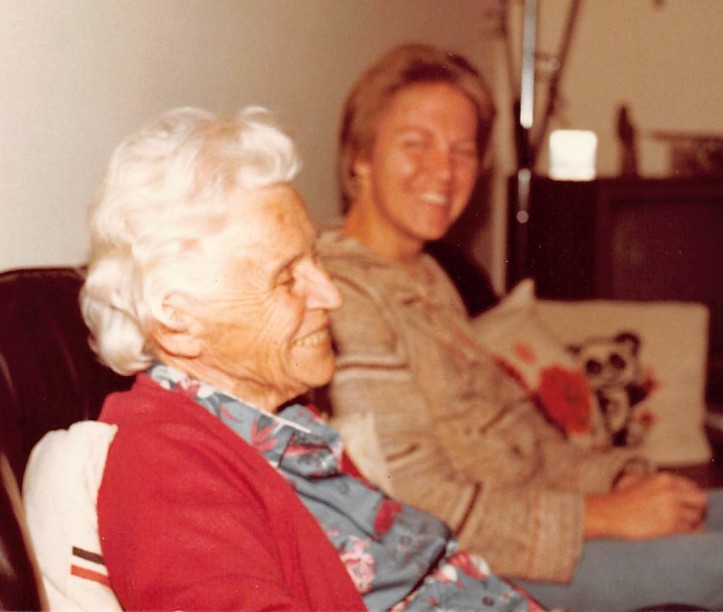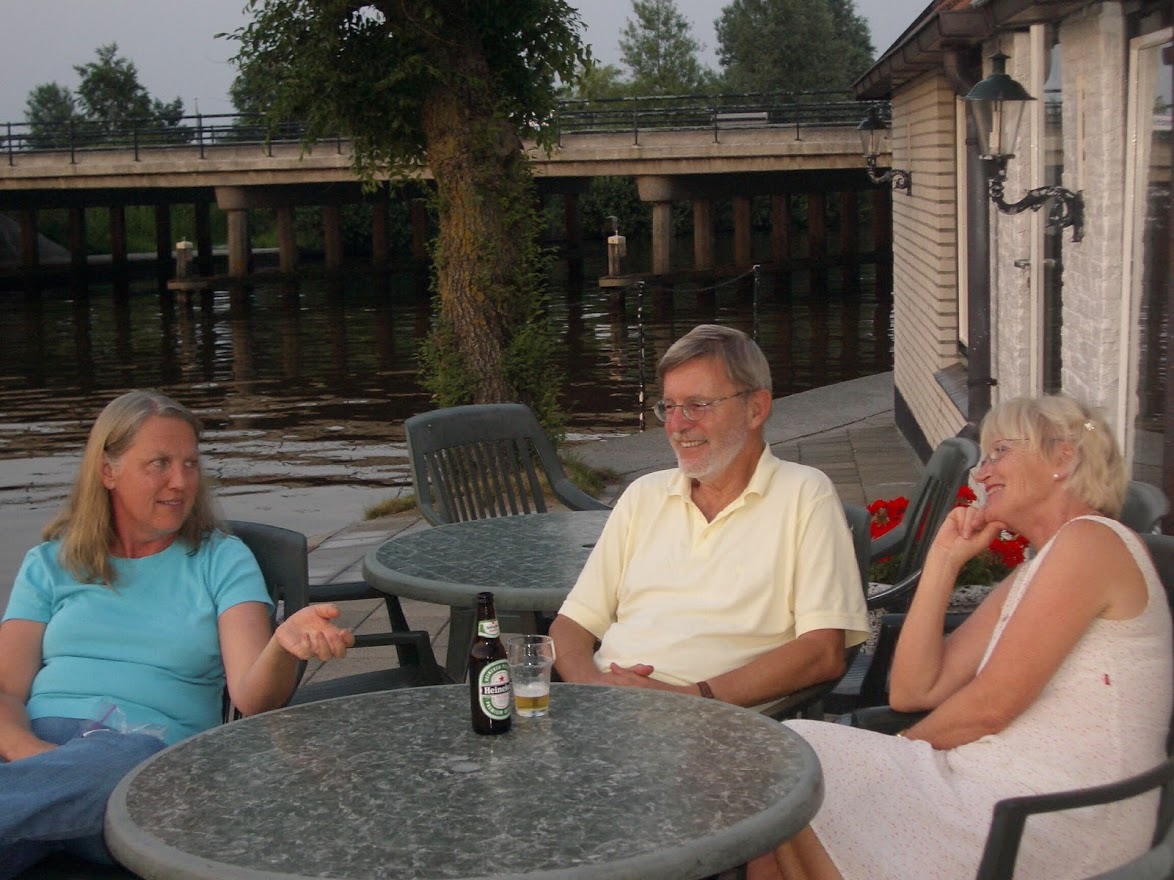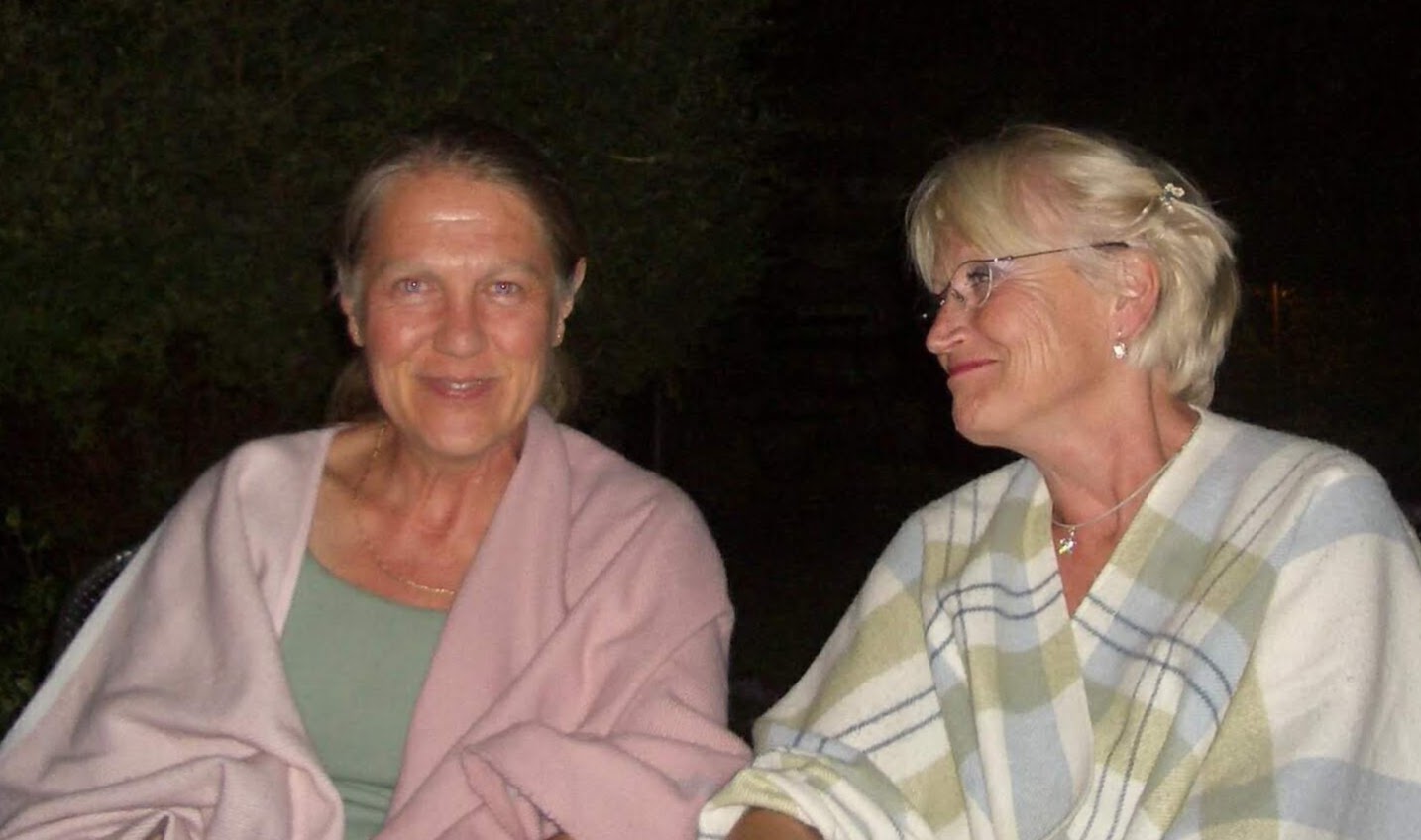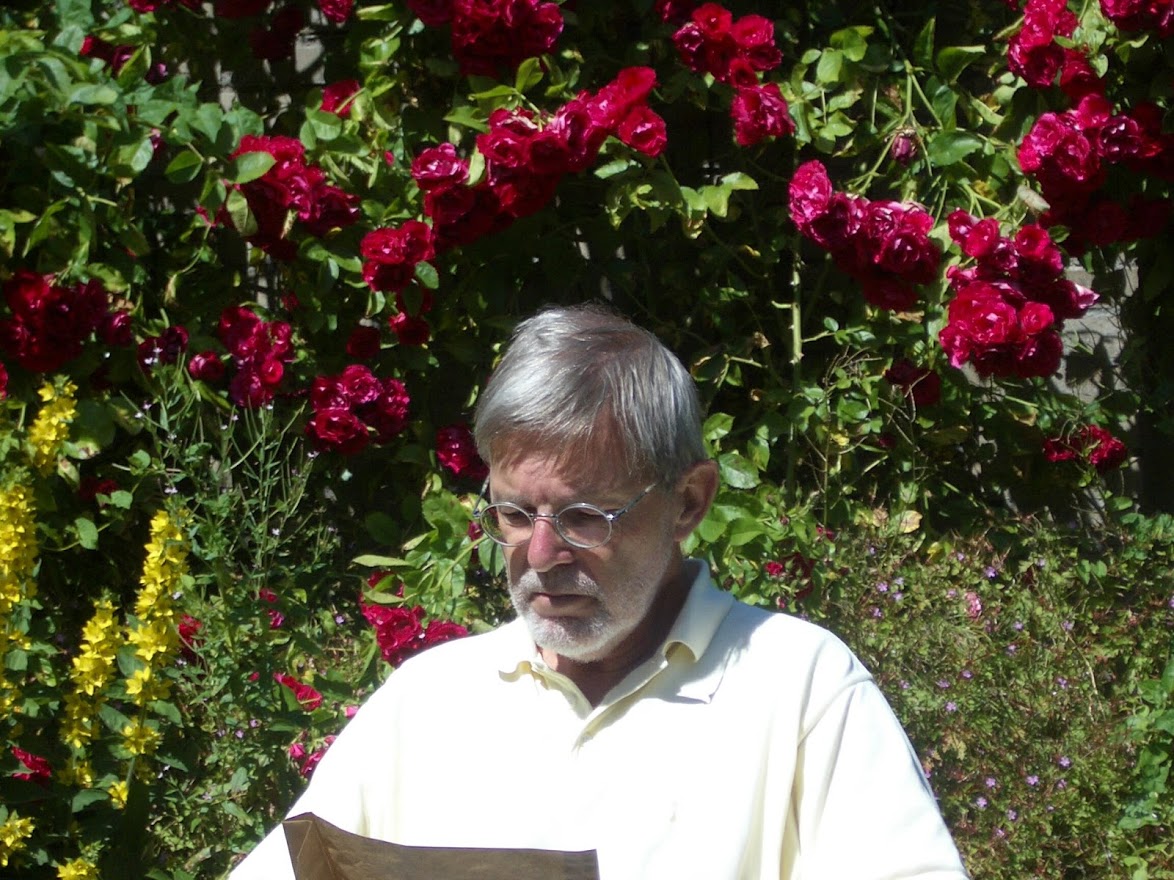
I believe that Codie‘s presence in our family gave all five of us Morris siblings an open, friendly inclination towards “elders,” a group that, at our ages of 63 through 73, we are well into joining. Maybe everyone who was fortunate enough to have had regular, positive contact with a grandparent or other elder in their young lives feels that way? When my sister Deb’s mother-in-law moved into a modest, senior living apartment building, Deb was inspired by chatting with the other residents to take on a project of interviewing them, eliciting from each stories of their lives and making a scrapbook of sorts for them to share with the others. She loved that experience, and, I believe, got as much joy from it as the residents did.
Humans of all ages have stories to tell, and the best of them impart compelling perspectives to readers and listeners. The anecdotes about kids that I sometimes include in my posts illustrate how differently they see the world; stories from people more advanced in years can offer particularly fascinating glimpses into times and places different from our own.
I moved to Phoenix in 1975, and soon after, joined the Tempe Community Symphony, where I met Luke Bunt, a flutist and emeritus ASU mathematics professor from Holland. I asked whether he would like to meet to play flute/piano music, and he agreed enthusiastically. A weekly tradition started for me with Luke and his “sparky” wife, Lies (pronounced “Lees”). She was generally open and friendly and also, at times, opinionated and outspoken. I found her charming, no matter her mood. Every Saturday afternoon when I arrived and rang the doorbell, I would hear Lies as she approached the door singing out, “Su-san!” After chatting together for a while, Luke and I would adjourn to the room with the piano (closing the door because Lies could not abide the sound of the flute!) and play for a couple of hours. At 5:00 or so, they would take me to dinner at a buffet restaurant they loved. I was single, had time on my hands in this new city, and felt privileged to spend lots of time with them. Over the next nine years, they became close friends and, finally, family.


Luke and Lies had two children, Lidy and Harry, born in 1940 and 1944 respectively. Since both visited AZ from Holland with their parents several times, they too became our friends. We visited both when we traveled to Europe in 2005 to celebrate Sam and Katie’s graduation from high school. Lidy and her husband Rob took us on several excursions near Eindhoven, where they lived, for typically Dutch experiences: a trip to a windmill, including a climb inside to see how it was built, and to a restaurant for Dutch pancakes, both sweet and savory.


a writer, perhaps?
Harry and Annette, who also live in Eindhoven, borrowed Lidy’s car and we caravanned for a couple of days with them around Friesland, an area in northwest Holland, stopping often to see the sights. One day, we stumbled across an open market day in a town that had a brass band, playing, of all things, “Always Look on the Bright Side of Life” from Monty Python’s The Life of Brian. Harry had planned the trip, hand-picking a couple of attractions he thought we would find interesting; he was right. We visited a small, family-owned ceramics factory run by folks who were quite elderly. The factory had been producing ceramics carved and painted in a very distinctive way (see “wooden shoes” in photo below) for generations. Sadly, the people we met were the last in their family line to carry on this work. I found some similar ceramics online. The style seems to be called “notch-cut pottery” or kerfsneewerk? My non-existent Dutch proficiency keeps me from further investigation.
Perhaps most memorable was the time we spent in “the world’s oldest working planetarium” (actually an orrery), built by amateur astronomer Eise Eisinga in 1781 in the town of Franeker. [If you’re curious to know more about the planetarium, take a look at the two short YouTube videos at the bottom.]


In 2016, Richard and I met up with Harry and Annette in Pisa, Italy for a couple of days, taking a one-day train ride to see the Cinque Terre. We spent every minute of those two days together, talking and laughing. Strange that they are such close friends when we’ve spent relatively little time with them.
Both Luke and Lies had stories to tell about their experiences during the German occupation of Holland. If memory serves, Luke was taken to a work camp for some period of time, but managed to escape somehow. (I wish I remembered more details about that.) Lies had given birth to two children during the course of the war, and had the challenge of raising them and keeping them fed and safe in difficult circumstances. She told me about having had a verboten radio, and about the day she was walking down a narrow, wooden walkway with mud on either side and came face-to-face — well, considering her height, it was probably face-to-chest — with a young Nazi soldier. They both stopped and he commanded her to step aside. She refused, saying fiercely, “I sought (thought) you were a gentleman!” The soldier stepped into the mud.
Luke and I shared an appreciation of certain types of humor. He loved reading stories by P.G. Wodehouse, as do I, and when I brought VHS tapes of Victor Borge to watch with them, all three of us joined in laughter. Luke had a very distinctive laugh in that it was mostly silent. His head would rear back, his eyes closed, his mouth open. I can’t recall any sound issuing forth, but he was clearly amused!
Luke and Lies had a conversation once that, when I recounted it to Harry, made him laugh and say that they were treating me to “typical Dutch humor.” Lies volunteered at the nearby hospital, taking flowers and such to patients in their rooms. She had visited a patient that day who had had an eye surgery. She recalled that he had been in for the same surgery on the other eye not long before, and cheerily remarked to him, “At least you have only two eyes!” Luke burst into laughter and said, “That was a remarkably quick calculation.”
Lies spoke English quite fluently, but occasionally, endearingly imperfectly. (How’s that for four adverbs in a row!) When I would tell her, for instance, about frustrating situations I was in, I’m sure that what she meant was, “You can’t do anything about it,” but what she said was, “You can do nussing (nothing) to it.” And she was always right. I need to say that to myself more often, especially when I’m outraged about something that is completely beyond my control: “Susan, you can do nussing to it.”
Luke was a horrible driver, going too fast, getting too close to the car in front, weaving within his lane — and sometimes beyond. When my parents visited once, he took the three of us for a drive on the Apache Trail, described in the link as “40 miles of steep, winding and mostly unpaved road past magnificent scenery of twisted igneous mountains with dense forests of saguaro and ferocactus, and several deep blue lakes.” We missed most of the magnificent scenery because our eyes were glued to the road (since Luke’s were not). I wouldn’t have been surprised if any or all of us had sustained a whiplash injury from the frequent, sudden (just in time) braking. Lies was in the front seat, alternately muttering and yelling in Dutch. I have no idea what she was saying, but her tone was unmistakable.

while in AZ
Harry told me my favorite Luke anecdote. Luke was, reportedly, mathematically brilliant, and I can vouch for his musical talent myself. His mastery in these areas was counter-balanced by nearly total physical ineptitude. His driving, described above, was one manifestation of that. Once when Luke was driving on an open road in Holland with Harry as a passenger, Luke’s hand moved suddenly and spasmodically, honking the horn. Harry said nothing about it, perhaps having come to expected unexpected movements from his father. After a few moments of silence, Luke observed, “It never hurts to honk the horn.”
Each December, I helped Luke and Lies assemble and decorate their artificial Christmas tree. When Harry was cleaning out their Tempe home at the end of their lives, he asked whether there was anything of theirs I would like to keep. He was somewhat stunned when I asked for that ugly tree; it was, of course, not the tree itself, but the associated memories that I wanted to hold close.
Both Luke and Lies died in 1984. Luke went through heart surgery a few years before that, which he desperately needed. I had known something was off. His flute playing deteriorated due to his inability to breathe deeply. He took part in an afternoon “salon” at the house where I lived at the time. He joined me and several other musician friends to present a Sunday afternoon recital to an audience of 20-25 other folks. Luke struggled, losing his place once and running out of breath often as he played. I recorded that event on a cassette. Several years later when Harry’s family visited, Jan-Erik, one of Harry’s sons, was excited to hear that I had a recording of his grandfather’s playing. He had adored his grandfather and played the flute himself. I so wish I had recorded when Luke was still playing well. Jan-Erik was disappointed when he heard the recording, though I explained the situation.
After the heart surgery, I was suddenly aware of how old my friends were. Every time I arrived at the Bunts’ front door and knocked, I held my breath a bit, hoping I would hear Lies’s melodious “Su-san!” One day early in 1984, I didn’t. As I recall, Luke had had a heart attack and Lies was with him at the hospital. I visited them, but could see that Luke was failing. I was playing in a community symphony at that time, and our performance took place during Luke’s last few days. The concert included Brahms’ Serenade #1, a gorgeous and difficult work. I had worked hard on several devilish viola passages, and did well, but with tears coming down my face thinking how Luke would have loved playing with us. He died a day or two later.
I do not remember seeing Lies at their home after that. I believe she was admitted to the hospital herself while Luke was still alive. Within a few weeks, Harry and Lidy came here to bring her back to Holland, where she died soon after as Annette held her in her arms. I was grateful to be going to my weekly dinner with women friends after my last visit. They understood my sadness, and I was glad for the company.
I started this post last week. In the days since then, memories of the Bunts continue to surface, but I’ll wrap up now. I’ve found so much pleasure in casting my mind back to the time when they were close by.
Here are more photos from our 2005 trip through Friesland, plus one of a couple of mementos: the cups were a gift from Lidy, and the “wooden shoes” are from the ceramic factory. The bottom two were taken on the beach in Cinque Terre in 2016.







Such a beautiful tribute to your dear friends, Susan. I remember your speaking about them often, especially in those early days. I’ve decided to adopt Luke’s advice, “It never hurts to honk your horn” as my motto. So apropos in so many situations. As always, thanks for sharing this touching reflection. Love you, my friend. S
On Tue, Aug 10, 2021, 5:43 PM itsjustapuzzle.com wrote:
> Boo’s Thoughts posted: ” Lies Bunt and me c. 1982 I believe that Codie’s > presence in our family gave all five of us Morris siblings an open, > friendly inclination towards “elders,” a group that, at our ages of 63 > through 73, we are well into joining. Maybe everyone who was for” >
LikeLike
Really enjoyed this post, Susan. What a wonderful experience for you (and for THEM)!
>
LikeLike
Hi Susan, I really enjoyed your “old folks” story on two levels. First because I am one of them. I love being a
“matriarch”, and all the love, respect and help that goes with that. I also enjoyed this story because I married
into a Dutch family. ( They had escaped the war in 1939, just in time.) My children are half Dutch, and as more
of the Dutch relatives arrived in town (Dallas), I had a great sense of the language and customs. Thanks, Peg
LikeLike
Hi Susan, I really enjoyed your “old folks” story on two levels. First because I am one of them. I love being a
“matriarch”, and all the love, respect and help that goes with that. I also enjoyed this story because I married
into a Dutch family. ( They had escaped the war in 1939, just in time.) My children are half Dutch, and as more
of the Dutch relatives arrived in town (Dallas), I had a great sense of the language and customs. Thanks, Peg
LikeLike
Beautiful, heart warming memories. Thanks for sharing!
LikeLike